
Aim
The primary aim of Global Accountancy Review is to advance knowledge and practice in accounting, auditing, corporate governance, and taxation through rigorous, impactful research. We seek to publish studies that not only contribute to academic discourse but also offer practical solutions for businesses, regulators, and society at large. GAR prioritizes work that explores contemporary issues such as sustainability reporting, AI-driven auditing, tax policy reforms, and the role of corporate governance in financial transparency.
Scope
Global Accountancy Review covers a broad spectrum of topics, organized into key thematic areas to ensure depth and relevance. In accounting and financial reporting, we examine IFRS/GAAP convergence, integrated reporting, and non-GAAP metrics. Our auditing section focuses on emerging technologies like blockchain and AI, as well as traditional concerns such as audit quality and ethics. Corporate governance research includes board diversity, executive compensation, and shareholder activism, while our taxation section addresses compliance challenges, international tax policy, and digital economy taxation. Additionally, we feature interdisciplinary work in ESG accounting, forensic accounting, and emerging market dynamics, ensuring a holistic approach to the field.
Sections
- Financial Reporting & Standards
- IFRS/GAAP implementation challenges
- Integrated reporting frameworks
- Non-GAAP financial measures
- XBRL and digital reporting innovations
- Earnings quality and management
- Auditing & Assurance
- AI and blockchain in audit processes
- Audit quality and independence
- Forensic accounting techniques
- ESG assurance frameworks
- Internal audit innovations
- Corporate Governance & Ethics
- Board diversity and effectiveness
- Executive compensation structures
- Whistleblowing mechanisms
- Anti-fraud controls
- Shareholder activism impact
- Taxation & Fiscal Policy
- International tax harmonization
- Digital economy taxation
- Transfer pricing innovations
- Tax avoidance/evasion studies
- SME tax compliance issues
- Sustainability & ESG Accounting
- Carbon accounting methodologies
- SDG-aligned financial reporting
- Green auditing standards
- Social impact measurement
- Climate-related financial disclosures
- Emerging Technologies in Accounting
- AI/ML applications in accounting
- Blockchain for transaction transparency
- Metaverse accounting challenges
- Robotic Process Automation
- Data analytics for financial decision-making
- Public Sector & Non-Profit Accounting
- Governmental accounting reforms
- Performance measurement in NGOs
- Public financial management
- Sovereign wealth fund reporting
- Disaster relief fund accounting
- Behavioral & Experimental Accounting
- Cognitive biases in financial decisions
- Nudging for tax compliance
- Experimental studies on reporting
- Investor perception research
- Ethical decision-making models
- Emerging Markets Accounting
- BRICS financial reporting
- Frontier market challenges
- Currency volatility accounting
- Islamic finance reporting
- Post-pandemic recovery analysis
- Accounting Education & Profession
- Curriculum innovation
- CPA evolution
- Skills gap analysis
- Ethics education
- Future-ready competencies
Vision
To establish GAR as a leading international journal that advances rigorous accounting research and its practical application across global markets. We aim to foster meaningful dialogue between academics, practitioners, and policymakers to address contemporary challenges in financial reporting, auditing, governance, and taxation. By promoting evidence-based insights and innovative methodologies.
Mission
Global Accountancy Review (GAR) launches to redefine accounting scholarship for a new era. In our inaugural volume, we prioritize groundbreaking research that establishes rigorous foundations for future discourse - particularly studies addressing digital transformation in auditing, evolving sustainability reporting standards, and cross-border regulatory challenges. We are committed to showcasing diverse methodological approaches while maintaining exceptional peer-review standards from day one.
Core Values:
- Scholarly Rigor - Upholding the highest standards of academic excellence
- Practical Impact - Prioritizing research with real-world relevance
- Global Relevance - Addressing accounting challenges across different economic contexts
- Ethical Foundation - Maintaining integrity in research and publication practices
- Innovation - Encouraging forward-looking approaches to accounting issues
- Inclusivity - Supporting diverse voices in accounting scholarship
Audience
- Academic Researchers (Doctoral candidates to full professors)
- Practicing Accountants (Big Four to corporate finance teams)
- Standard-Setters & Regulators (IASB, FASB, SEC counterparts)
- Policy Advisors (Government and NGO financial specialists)
- Educators (University faculty and professional trainers)